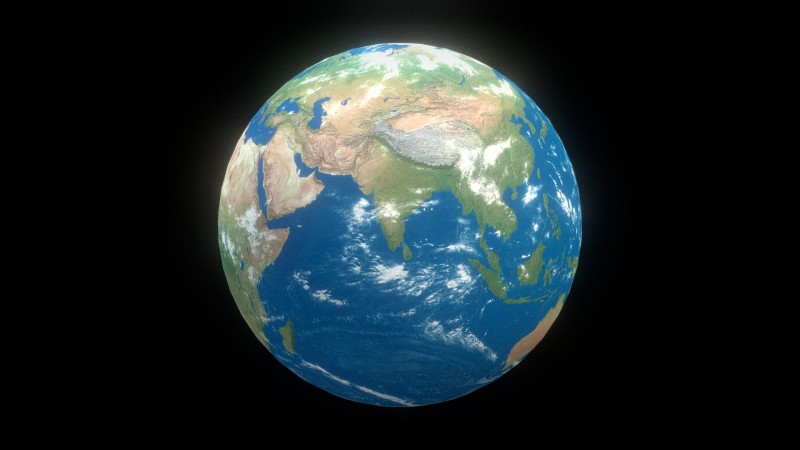
Astronomy enthusiasts and scientists have reason to be excited as recent findings hint at a remarkable discovery within our own solar system. Researchers have unearthed compelling evidence pointing towards the existence of a planet that bears a striking resemblance to Earth. This revelation has ignited curiosity and intrigue within the scientific community, as it could potentially unravel the mysteries of life-sustaining conditions beyond our home planet.
The quest to locate Earth-like planets has been an enduring mission for astronomers and planetary scientists. The allure of these planets lies in their potential to host environments conducive to supporting life. Moreover, the identification of such planets holds the key to understanding the broader possibilities of habitable worlds in the cosmos.
In a groundbreaking development, astronomers have unveiled tantalizing hints of a planet with Earth-like characteristics lurking within our solar system. This celestial enigma is believed to orbit the Sun in a region that extends beyond Neptune, known as the Kuiper Belt.
The revelation stems from the meticulous work of Patryk Sofia Lykawka, a researcher affiliated with Kindai University in Osaka, Japan, and Takashi Ito, who is associated with the National Astronomical Observatory of Japan in Tokyo. Their findings have been documented and published in The Astronomical Journal, marking a significant milestone in the pursuit of cosmic understanding.
The researchers make a bold prediction in their study, stating, "We predict the existence of an Earth-like planet." They postulate that a primordial planetary body may have endured within the distant confines of the Kuiper Belt, evolving into what they term a Kuiper Belt planet (KBP). This hypothesis gains credence from the fact that numerous such bodies are believed to have existed in the early days of our solar system.
To gain a deeper understanding of this hypothetical planet's existence, scientists delve into the intricacies of the distant Kuiper Belt. This region, believed to house remnants from the solar system's formation, may hold the key to confirming or refuting the presence of an undiscovered planet in the far reaches of our solar system.
In their concluding remarks, the researchers state, "In conclusion, the results of the Kuiper Belt planet scenario support the existence of a yet-undiscovered planet in the far outer Solar System." This bold assertion underscores the significance of their findings and the potential implications for our understanding of the solar system's composition.
Scientists speculate that the theorized planet's orbit could extend to a distance ranging from 250 to 500 astronomical units (AU) from the Sun. This remote location adds an element of intrigue to the discovery, as it pushes the boundaries of our solar system's known celestial inhabitants.
The discovery of a planet in the Kuiper Belt holds great promise for shedding light on the complex processes of planet formation and evolution. It promises to provide fresh insights and perspectives in the dynamic field of planetary science.
The revelation of an Earth-like planet within our solar system has ignited the imagination of scientists and enthusiasts alike. This discovery challenges our preconceptions about the boundaries of our cosmic neighborhood and reinvigorates our curiosity about the secrets hidden in the depths of space.
While this discovery is undoubtedly significant, it is important to remember that it represents just one step on the path of exploration. The search for Earth-like planets, whether within our solar system or in distant galaxies, remains an ongoing and exhilarating pursuit.
The relentless pursuit of knowledge and the willingness to explore the unknown are intrinsic to human nature. The discovery of an Earth-like planet in our solar system serves as a testament to our boundless curiosity and our unending quest to comprehend the universe.
As we contemplate the existence of this enigmatic celestial body within our solar system, we are reminded of the vastness and complexity of the cosmos. The universe continues to surprise us, offering new riddles and mysteries waiting to be unraveled.
The discovery of an Earth-like planet in our solar system raises intriguing questions about the potential for extraterrestrial life. Could this distant world harbor conditions conducive to life as we know it? The answer to this question could reshape our understanding of life's prevalence in the universe.
The Kuiper Belt, once regarded as a region of frozen debris, now takes center stage as a potential cradle for planetary evolution. Its significance in this discovery highlights the ever-evolving nature of scientific exploration.
This discovery serves as a bridge between the familiar and the unknown within our solar system. It beckons us to expand our horizons, both literally and figuratively, as we venture into uncharted territories.
The tantalizing prospect of an Earth-like planet in the Kuiper Belt beckons us towards a new frontier of exploration. It challenges us to reconsider our understanding of the solar system and encourages us to push the boundaries of our knowledge.
The quest to uncover the truth about this newfound celestial body promises to fuel scientific inquiry for years to come. It reminds us of the power of human curiosity and our capacity to unveil the secrets of the cosmos.
The existence of an Earth-like planet within our solar system presents a cosmic puzzle that scientists are eager to solve. It is a reminder that the universe is far from fully understood, and there are still many mysteries waiting to be unraveled.
As we contemplate the implications of this discovery, we are reminded of the wonder and awe that the universe inspires. It is a testament to the beauty and complexity of the cosmos, and it encourages us to continue our exploration with renewed vigor.
Which planet is which relative of Mother Earth?
India's Aditya-L1 Solar Mission Marks a Milestone in Space Exploration
Weight Comparison of a 50 kg Man on Jupiter, Saturn, and Beyond